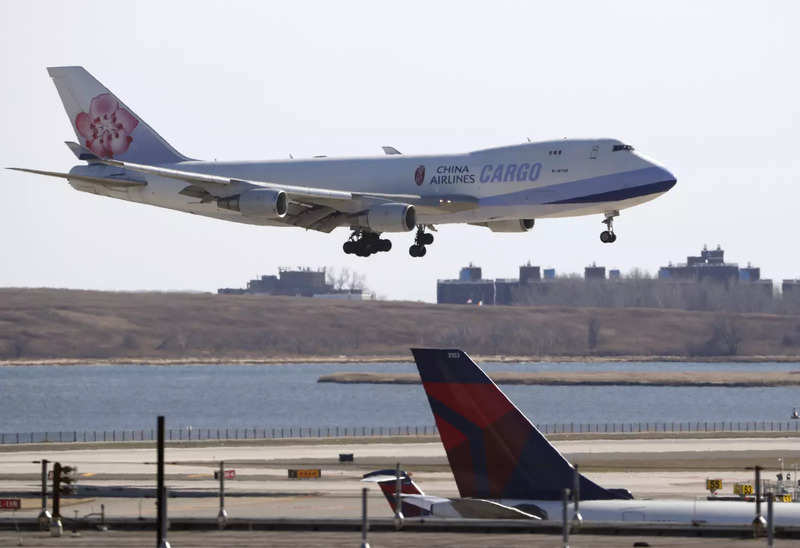

The rollout of recent 5G wi-fi service within the U.S. didn’t have the much-dreaded results of crippling air journey, though it started in rocky vogue, with worldwide airways canceling some flights to the U.S. and spotty issues displaying up on home flights.
Airline trade officers say the choice by AT&T and Verizon – below strain from the White Home – to delay activating 5G towers close to many airports has defused the scenario.
The delay is giving the Federal Aviation Administration extra time to clear extra planes to function freely round 5G networks. On Thursday, the FAA mentioned it had granted new approvals that may permit an estimated 78% of the U.S. airline fleet to make landings even below low-visibility circumstances at airports the place the brand new, sooner wi-fi service has been turned on.
That also leaves about one-fifth of the fleet susceptible to being prevented from touchdown at some airports throughout unhealthy climate, however that chunk is for certain to shrink. The CEOs of American and United say they do not count on any main disruptions to flights.
Here’s a rundown of what occurred.
WHAT’S THE CONCERN ALL ABOUT?
Cellphone corporations have been rolling out next-generation 5G service for a number of years, and this newest slice of it, the so-called C-Band, helps make AT&T and Verizon extra aggressive with T-Cellular. It guarantees sooner and extra steady wi-fi networks. However 5G continues to be largely promise and fewer precise purposes. For now, it permits you to obtain a film a lot sooner. However the telecommunications trade is touting it as important for autonomous autos, trendy manufacturing, sensible cities, telehealth and different fields that will depend on a universe of internet-connected gadgets.
The priority comes from the truth that this newest little bit of 5G operates on a part of the radio spectrum that’s near the vary utilized by plane devices referred to as radio altimeters, which measure how excessive plane are above the bottom.
The difficulty was highlighted in a 2020 report by RTCA, an aviation analysis group, prompting pilots and airways to sound alarms about attainable radio interference that would jeopardize security. The telecom trade, led by commerce group CTIA, disputes the 2020 report and says 5G poses no danger to aviation.
WHY DID AIRLINES CANCEL SOME FLIGHTS TO THE U.S. THIS WEEK?
Worldwide airways canceled some flights that have been scheduled to function simply as the brand new networks went reside. They feared not having the ability to land at their locations below 5G-related restrictions imposed by the FAA.
HOW MANY FLIGHTS?
Airways canceled greater than 350 flights on Wednesday, in line with FlightAware. That feels like lots, however it’s simply 2% of all scheduled flights – and it is doubtless most of them acquired scrubbed for different causes. For context, there have been almost 10 occasions as many cancellations on Jan. 3, when airways struggled with winter climate and huge numbers of staff calling in sick with COVID-19.
IS THE PROBLEM SOLVED?
No, though the FAA says it’s making progress by figuring out that extra altimeters are adequately protected towards interference from 5G C-Band alerts. Planes with sure altimeters would possibly by no means be authorised, which implies the operators would doubtless have to put in new tools to land in any respect airports.
IS THIS A PROBLEM ONLY IN THE U.S.?
For essentially the most half, sure. The FAA says there are a number of explanation why the 5G C-Band rollout has been extra of a problem for airways within the U.S. than in different nations: Mobile towers use a extra highly effective sign power than these elsewhere; the 5G community operates on a frequency nearer to the one many altimeters use, and cell tower antennae level up at the next angle. CTIA disputes the FAA’s claims.
In France, 5G networks close to airports should function at decreased energy to decrease the danger of interference with planes.
IS THE 5G ROLLOUT COMPLETE?
No. Verizon and AT&T activated about 90% of their 5G C-Band towers this week however agreed to not activate these inside a 2-mile radius of many airports. The businesses nonetheless wish to activate these towers, however there may not be settlement till the FAA is glad that an amazing portion of the airline fleet can function safely across the alerts.
WHAT COMPANIES ARE INVOLVED IN THE ISSUE?
Moreover the 2 large telecommunications corporations, the record contains plane makers Boeing and Airbus and altimeter subcontractors Collins, Honeywell and Thales. Then there are the airways, whose dire warning this week of widespread flight cancellations added to strain on the telecommunications corporations to delay activating one of these 5G service round airports.
WHOSE SIDE IS THE GOVERNMENT ON?
Each.
The Federal Communications Fee, which performed the $80 billion public sale that awarded C-Band spectrum to Verizon and AT&T, says there’s sufficient buffer between this slice of 5G and plane altimeters for security. However the FAA and Transportation Secretary Pete Buttigieg took the airways’ facet within the dispute. They requested the telecom corporations to delay their rollout round airports.
Some specialists say poor coordination and cooperation among the many two federal businesses is as a lot in charge as any technical points.
WHY DID IT COME TO A CRISIS?
That ought to not have occurred. The FAA and airways had loads of discover that C-Band was coming – it has been talked about for years. They are saying they tried to boost their considerations however have been ignored by the FCC.
American Airways CEO Doug Parker indicated he was proud of the decision however not the method.
“It wasn’t our best hour, I feel, as a rustic,” he mentioned.
FbTwitterLinkedin






